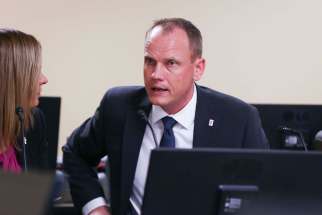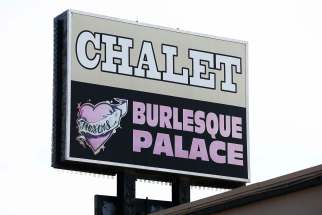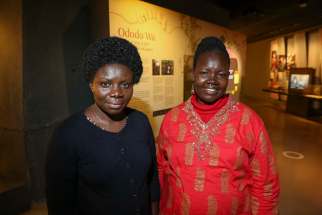Abducted, enslaved, outspoken Survivors of Ugandan rebel group share their stories at human rights museum
Read this article for free:
or
Already have an account? Log in here »
To continue reading, please subscribe:
Monthly Digital Subscription
$0 for the first 4 weeks*
- Enjoy unlimited reading on winnipegfreepress.com
- Read the E-Edition, our digital replica newspaper
- Access News Break, our award-winning app
- Play interactive puzzles
*No charge for 4 weeks then price increases to the regular rate of $19.00 plus GST every four weeks. Offer available to new and qualified returning subscribers only. Cancel any time.
Monthly Digital Subscription
$4.75/week*
- Enjoy unlimited reading on winnipegfreepress.com
- Read the E-Edition, our digital replica newspaper
- Access News Break, our award-winning app
- Play interactive puzzles
*Billed as $19 plus GST every four weeks. Cancel any time.
To continue reading, please subscribe:
Add Free Press access to your Brandon Sun subscription for only an additional
$1 for the first 4 weeks*
*Your next subscription payment will increase by $1.00 and you will be charged $16.99 plus GST for four weeks. After four weeks, your payment will increase to $23.99 plus GST every four weeks.
Read unlimited articles for free today:
or
Already have an account? Log in here »
Hey there, time traveller!
This article was published 22/10/2019 (2245 days ago), so information in it may no longer be current.
Evelyn Amony was just 11 years old, and with her grandmother at the time. Grace Acan was away at a boarding school for girls, where she loved to read English romance novels.
Both were captured by the notorious Lord’s Resistance Army in Uganda. By 14, Amony was forced to marry its infamous leader, Joseph Kony.
“I need the world to know what happened to me and other women,” said Amony, who, along with Acan, is in Winnipeg as part of the Canadian Museum for Human Rights exhibition Ododo Wa: Stories of Girls in War.

On display are Acan’s favourite paperback romances and Amony’s green skirt torn by bullet holes, showing the stark contrast of their lives before and after they were abducted and had their childhoods taken from them.
The girls served as soldiers and labourers and were forced to act as wives to the militia commanders and have their children. They suffered at the hands of their captors and being caught in the crossfire of the warlord’s militia and Ugandan government forces.
The pair are not shy about sharing their experiences — they want to let the world know what happened, and what is still happening.
“Other women in the world are still crying for their daughters,” said Amony, who escaped with just one of the two children she had in captivity.
“My daughter is still missing,” she said Tuesday of the girl she hasn’t seen since 2004, who would now be 17, “if she is alive. I still have hope for her.”
“My daughter is still missing. If she is alive. I still have hope for her.” – Evelyn Amony
Kony, meanwhile, remains at large. He was indicted in 2005 for crimes against humanity by the International Criminal Court.
In Uganda, he abducted thousands of children and forced them to join his rebel army. In 2012, a UN security council report in detailed his rebel army’s crimes against children in the Democratic Republic of the Congo, South Sudan and the Central African Republic, where Kony’s group kidnapped at least 591 children (268 girls) between July 2009 and February 2012.
A global social media campaign calling for his capture was followed with a manhunt by the U.S. and Ugandan governments. Both gave up the active search for Kony in 2017.
Meanwhile, his victims are largely forgotten, the Ugandan women said.
“Women had no voice,” said Acan, who was abducted by the Lord’s Resistance Army with 138 other girls from St. Mary’s College Aboke, a Catholic boarding school. “I’m telling my story now. It was not, at first, easy.”
Meeting other women like Amony, who’d been held captive and survived, gave her strength and was a form of therapy, Acan said.
Amony said she’s forgiven Kony — she has no choice in order to move forward with her life. The women said they’re focusing on the issue, not the perpetrator.
“Let the past go, and go forward to a better future,” said Acan.
She and Amony met in 2006; in 2008, they formed the Ugandan Women’s Advocacy Network, representing 900 survivors. This summer, the Ugandan government created a transitional justice policy to address issues of past human rights violations in order to promote justice, accountability, reconciliation and a sustainable peace.
“We need to stop the abduction of girls and children,” said Acan.
She and Amony are speaking at the CMHR’s Rights Today gallery at 1:30 p.m. Wednesday, with curator Isabelle Masson and representatives of the Toronto-based Conjugal Slavery in War project.
carol.sanders@freepress.mb.ca

Our newsroom depends on a growing audience of readers to power our journalism. If you are not a paid reader, please consider becoming a subscriber.
Our newsroom depends on its audience of readers to power our journalism. Thank you for your support.









